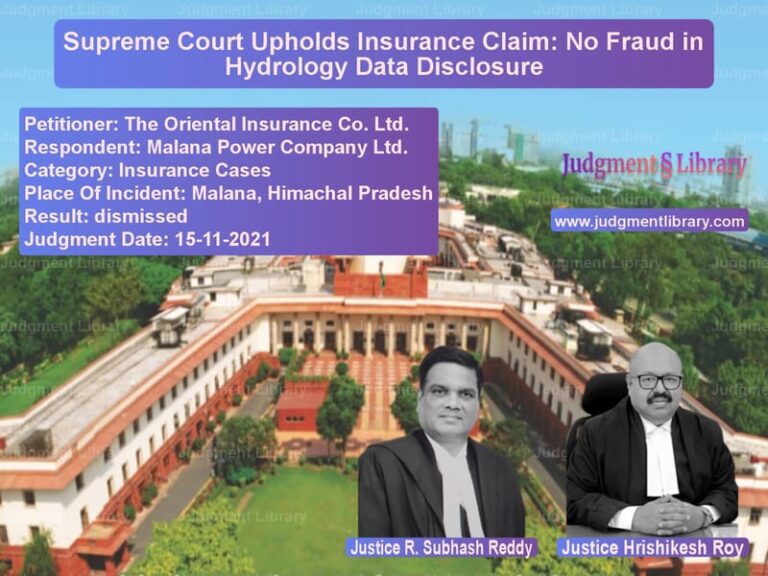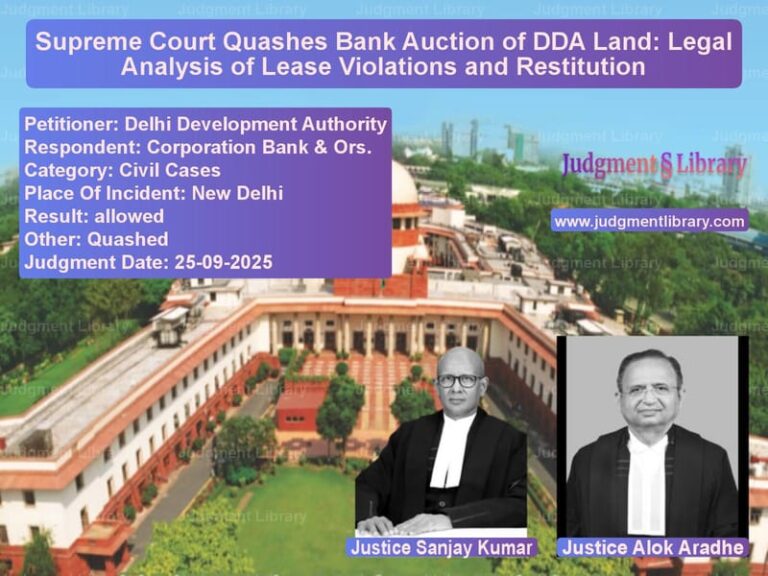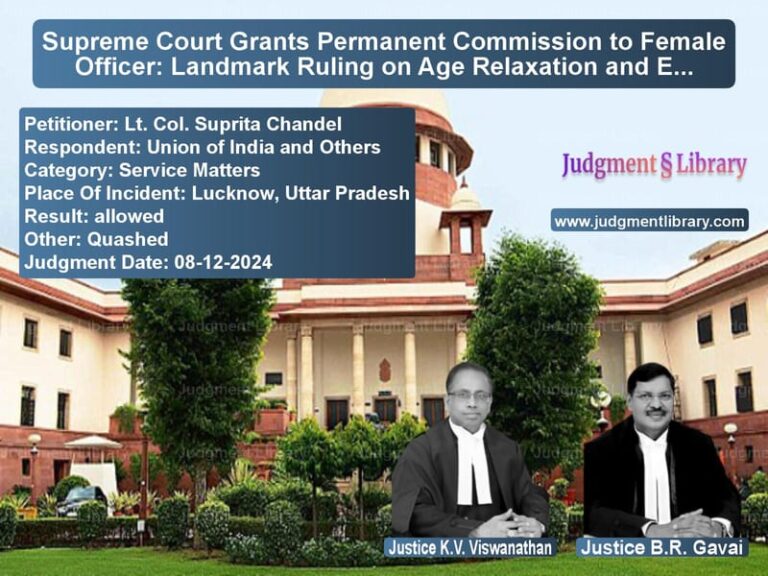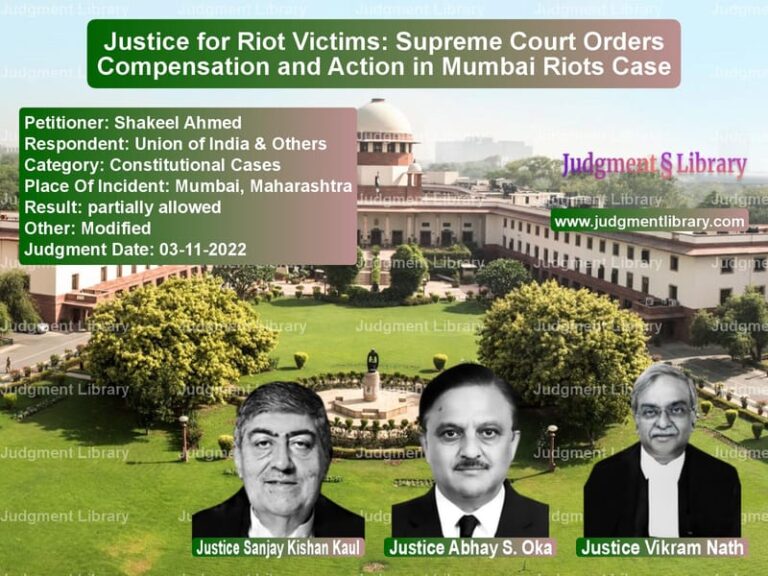Supreme Court Restores Criminal Proceedings in Dishonored Cheque Case
The Supreme Court of India, in the case of K. Hymavathi v. The State of Andhra Pradesh & Anr., has reinstated criminal proceedings against the respondent for issuing a dishonored cheque. The judgment clarifies the application of the Negotiable Instruments Act, 1881, particularly the enforceability of promissory notes and cheques related to time-barred debts.
Background of the Case
The dispute arose when the appellant, K. Hymavathi, filed complaints under Section 138 of the Negotiable Instruments Act (NI Act) against the respondent after a cheque issued for Rs. 10,00,000 was dishonored due to insufficient funds. The cheque was issued as part of a repayment for a loan of Rs. 20,00,000, which the respondent had taken in 2012. The loan was secured through a promissory note, which stated that the amount was to be repaid by December 2016.
Following the dishonor of the cheque, the appellant issued a legal notice, which was met with multiple replies from the respondent. Eventually, the appellant filed complaints before the Chief Metropolitan Magistrate in Visakhapatnam. The Magistrate took cognizance of the matter and issued summons.
However, the respondent moved the Andhra Pradesh High Court under Section 482 of the Criminal Procedure Code (CrPC), seeking to quash the proceedings. The High Court ruled in favor of the respondent, holding that the loan was time-barred and therefore not a legally enforceable debt under Section 138 of the NI Act. Aggrieved by this decision, the appellant approached the Supreme Court.
Key Legal Issues Before the Supreme Court
- Whether a cheque issued in discharge of a time-barred debt constitutes a legally enforceable debt under the NI Act.
- Whether the High Court was correct in quashing the criminal proceedings at the preliminary stage.
- The applicability of Section 25(3) of the Indian Contract Act, 1872, in cases involving time-barred debts.
Arguments by the Appellant
The appellant contended:
- The cheque was issued to partially discharge an existing debt, and therefore, it constituted a promise to pay under Section 25(3) of the Indian Contract Act.
- The High Court erred in holding that the debt was not legally enforceable merely because the limitation period had expired.
- The NI Act creates a presumption under Section 139 that every cheque is issued for the discharge of a legally enforceable debt or liability.
- The High Court quashed the complaint without considering the evidence that would be presented during the trial.
Arguments by the Respondent
The respondent countered:
- The promissory note was executed in 2012, and the limitation period for recovering the debt had expired by 2016.
- A time-barred debt is not a legally enforceable debt under the NI Act.
- The complaint under Section 138 was not maintainable because the dishonored cheque was issued for a debt that could no longer be legally enforced.
- The High Court correctly quashed the proceedings to prevent the abuse of process.
Supreme Court’s Analysis
1. Enforceability of a Time-Barred Debt
The Court examined whether a cheque issued to repay a time-barred debt qualifies as a legally enforceable obligation. It referred to S. Natarajan v. Sama Dharman and A.V. Murthy v. B.S. Nagabasavanna, holding that:
“A cheque issued for a time-barred debt is a valid contract under Section 25(3) of the Indian Contract Act and is enforceable.”
2. Presumption Under Section 139 of the NI Act
The Court reiterated that Section 139 of the NI Act presumes that a cheque is issued to discharge a debt unless proven otherwise. It stated:
“The presumption under Section 139 must be rebutted with evidence, and such factual determination cannot be made at the stage of quashing proceedings.”
3. Premature Quashing of Proceedings
The Court held that the High Court had exceeded its jurisdiction by quashing the case at the preliminary stage. It cited the principle established in Expeditious Trial of Cases under Section 138 of NI Act, stating:
“The question of whether the debt was enforceable should be decided during trial and not through quashing proceedings under Section 482 CrPC.”
Supreme Court’s Judgment
The Supreme Court allowed the appeal, set aside the High Court’s order, and restored the criminal proceedings. The key directions were:
- The complaints were reinstated before the Chief Metropolitan Magistrate, Visakhapatnam.
- The trial court was directed to complete the proceedings within six months.
- The respondent could contest the enforceability of the debt during the trial.
The Court concluded:
“The complaint under Section 138 of the NI Act was maintainable. The High Court’s decision to quash the case prematurely was erroneous.”
Implications of the Judgment
This ruling has significant implications:
- Clarifies Legal Position on Time-Barred Debts: It establishes that cheques issued for time-barred debts are enforceable under the NI Act.
- Preserves the Integrity of Trial Proceedings: The judgment ensures that complaints under Section 138 are not dismissed prematurely.
- Strengthens Creditor Rights: It reinforces the principle that a cheque is a binding promise to pay, even if the original debt has exceeded the limitation period.
Conclusion
The Supreme Court’s ruling in K. Hymavathi v. The State of Andhra Pradesh & Anr. upholds the enforceability of cheques issued for time-barred debts and limits the scope of quashing proceedings. By restoring the case for trial, the judgment affirms the rights of creditors while ensuring that accused persons have the opportunity to contest allegations in court.
Petitioner Name: K. Hymavathi.Respondent Name: The State of Andhra Pradesh & Anr..Judgment By: Justice A.S. Bopanna, Justice Prashant Kumar Mishra.Place Of Incident: Visakhapatnam, Andhra Pradesh.Judgment Date: 06-09-2023.
Don’t miss out on the full details! Download the complete judgment in PDF format below and gain valuable insights instantly!
Download Judgment: k.-hymavathi-vs-the-state-of-andhra-supreme-court-of-india-judgment-dated-06-09-2023.pdf
Directly Download Judgment: Directly download this Judgment
See all petitions in Cheque Dishonour Cases
See all petitions in Debt Recovery
See all petitions in Contract Disputes
See all petitions in Judgment by A. S. Bopanna
See all petitions in Judgment by Prashant Kumar Mishra
See all petitions in allowed
See all petitions in Remanded
See all petitions in supreme court of India judgments September 2023
See all petitions in 2023 judgments
See all posts in Civil Cases Category
See all allowed petitions in Civil Cases Category
See all Dismissed petitions in Civil Cases Category
See all partially allowed petitions in Civil Cases Category







